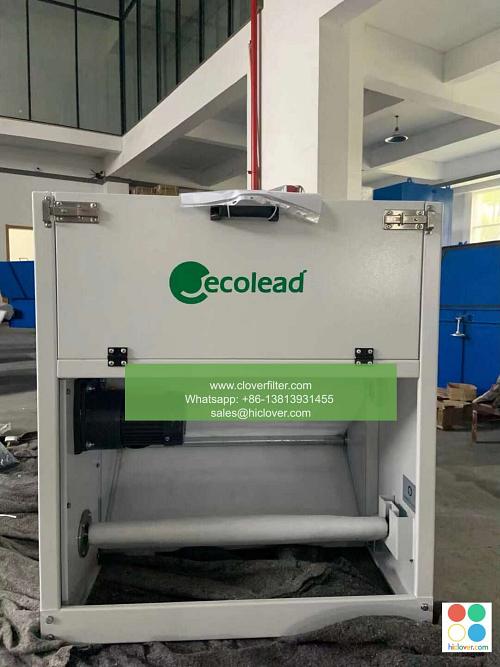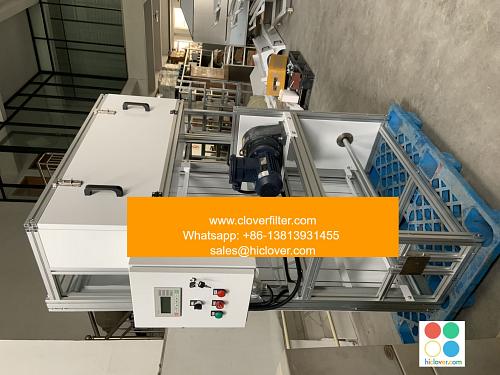Automatic Roll Air Filters in Food Processing: Maintaining Clean Air

Air filtration is a critical aspect of food processing, as it ensures the quality and safety of the final product. One effective way to maintain clean air in food processing facilities is by using automatic roll air filters. These filters are designed to capture airborne contaminants, such as dust, pollen, and other particles, and are especially useful in environments where food is being processed, packaged, or stored.
Automatic roll air filters work by drawing in air through a filter medium, which is typically a pleated or flat material. The filter medium is designed to capture particles as small as 0.3 microns, including bacteria, viruses, and other microorganisms that can contaminate food products. The filtered air is then released back into the environment, providing a clean and safe atmosphere for food processing.
The benefits of using automatic roll air filters in food processing are numerous. For one, they help to prevent contamination of food products, which can lead to spoilage, recalls, and damage to a company’s reputation. By removing airborne contaminants, these filters also help to reduce the risk of foodborne illnesses, which can have serious consequences for consumers. Additionally, automatic roll air filters can help to improve the overall quality of the air in a food processing facility, creating a healthier and more comfortable working environment for employees.
Another advantage of automatic roll air filters is their ease of use and maintenance. Unlike traditional air filters, which require manual replacement and maintenance, automatic roll air filters are designed to be self-sustaining. They can be programmed to automatically replace the filter medium when it becomes dirty or clogged, eliminating the need for manual intervention. This not only saves time and labor but also ensures that the air filtration system is always functioning at optimal levels.
In food processing facilities, automatic roll air filters can be used in a variety of applications, including processing lines, packaging areas, and storage rooms. They are especially useful in areas where food is being handled, such as in meat, poultry, and dairy processing plants. By installing automatic roll air filters in these areas, food processors can help to ensure the quality and safety of their products, while also reducing the risk of contamination and foodborne illness.
In addition to their practical benefits, automatic roll air filters also offer a number of economic advantages. By reducing the risk of contamination and foodborne illness, these filters can help to minimize the financial losses associated with product recalls and damage to a company’s reputation. They can also help to reduce energy costs, as they are designed to be energy-efficient and can be programmed to operate only when necessary.
Furthermore, automatic roll air filters can be integrated with other air filtration systems, such as HEPA filters and UV air purifiers, to provide a comprehensive air filtration solution. This can be especially useful in food processing facilities where multiple types of airborne contaminants are present. By combining different types of air filtration systems, food processors can create a robust and effective air filtration strategy that meets their specific needs and requirements.
Overall, automatic roll air filters are a vital component of any food processing facility’s air filtration strategy. They offer a reliable, efficient, and cost-effective way to maintain clean air and prevent contamination, and are an essential tool for ensuring the quality and safety of food products.
Conclusion
In conclusion, automatic roll air filters are a crucial component of food processing facilities, providing a reliable and efficient way to maintain clean air and prevent contamination. Their ease of use, low maintenance requirements, and economic benefits make them an attractive option for food processors looking to improve the quality and safety of their products. By installing automatic roll air filters in their facilities, food processors can help to ensure the quality and safety of their products, while also reducing the risk of contamination and foodborne illness.
Frequently Asked Questions (FAQs)
Q: How often should automatic roll air filters be replaced?
A: The replacement frequency of automatic roll air filters depends on the specific application and usage. Typically, they should be replaced every 1-3 months, or when the filter medium becomes dirty or clogged.
Q: Can automatic roll air filters be customized to meet specific needs?
A: Yes, automatic roll air filters can be customized to meet specific needs and requirements. They are available in a range of sizes, shapes, and filter media types, and can be programmed to operate in a variety of modes.
Q: Are automatic roll air filters suitable for all types of food processing facilities?
A: Yes, automatic roll air filters are suitable for all types of food processing facilities, including meat, poultry, dairy, and packaged food plants. They can be used in a variety of applications, including processing lines, packaging areas, and storage rooms.
Q: How do automatic roll air filters compare to traditional air filters?
A: Automatic roll air filters offer several advantages over traditional air filters, including ease of use, low maintenance requirements, and economic benefits. They are also more efficient and effective at capturing airborne contaminants, making them a popular choice for food processing facilities.


